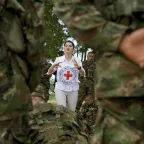In times of insecurity and conflict, states must work together to uphold and strengthen international humanitarian law
… Mine Ban Convention, the Biological Weapons Convention, the Chemical Weapons Convention and the Treaty on the Prohibition of Nuclear Weapons). Under the respective …




